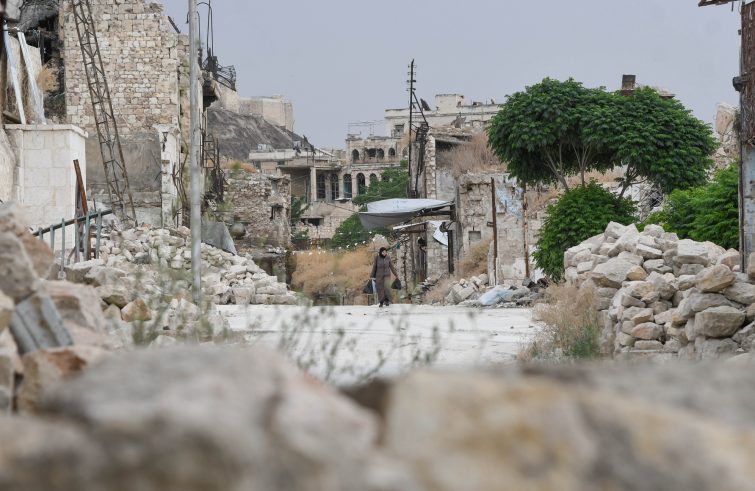
“Next March 15 marks 10 years since the outbreak of civil war. And there’s every indication that things will be worse in the future, because we don’t know how it will end. Our present is one of extreme poverty, hunger, abuses, lack of all basic services, notably healthcare. The situation is bound grow worse and people are desperate because they don’t know where to turn. A few evenings ago, on my way home, I saw people searching for food leftovers in the trash. I had never seen it before, not even when we were living under the bombs.”
 It’s the first-hand account to SIR by Father Hanna Jallouf, Franciscan priest of the Custody of the Holy Land, parish priest of Knaye, one of the three Christian villages in the Orontes Valley, in the northwest of Syria, in the province of Idlib – still under the domination of Hayat Tahrir al-Sham (HTS) jihadist militants.
It’s the first-hand account to SIR by Father Hanna Jallouf, Franciscan priest of the Custody of the Holy Land, parish priest of Knaye, one of the three Christian villages in the Orontes Valley, in the northwest of Syria, in the province of Idlib – still under the domination of Hayat Tahrir al-Sham (HTS) jihadist militants.
The war is not over, appeal from the Pope. “The war is not over, it has just faded from international media coverage”, denounced Father Hanna, “Pope Francis’ is the only voice that never stops denouncing the situation in Syria.” Yesterday, after the Angelus prayer, the Holy Father renewed his appeal: “I renew my heartfelt appeal for all parties to the conflict to show signs of goodwill, so that a glimmer of hope may open up for the exhausted population” especially “the most vulnerable, such as children, women and the elderly.”
“I also hope for a decisive and renewed commitment, constructive and in solidarity, on the part of the international community, so that, once the weapons have been laid down, the social fabric can be mended and reconstruction and economic recovery can begin.”
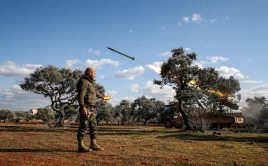 “Syrian army militia and paramilitary forces’ offensives in Idlib governorate seem to have subdued for now, while serious tensions persist among the rebel groups”, the Franciscan priest continued. “It’s a condition of war waged by ‘every one against every one’ to secure Ankara’s aids, controlled mainly by HTS. Tensions have also flared up in Aleppo and in the north-eastern areas in particular, in Hasakah, Qamishli and al-Shahba, where Damascus government-affiliated groups and Kurdish-led Syrian Democratic Forces (SDF), an ethnic-religious alliance of Kurds, Arabs, Turkmen, Armenians and Chechens, with its armed wing in the Kurdish People’s Protection Units (YPG), are fighting against each other. The Hasakah governorate is of strategic importance owing to the abundance of agricultural crops such as wheat and legumes and, above all, its oil fields, accounting for most of Syria’s oil requirements.
“Syrian army militia and paramilitary forces’ offensives in Idlib governorate seem to have subdued for now, while serious tensions persist among the rebel groups”, the Franciscan priest continued. “It’s a condition of war waged by ‘every one against every one’ to secure Ankara’s aids, controlled mainly by HTS. Tensions have also flared up in Aleppo and in the north-eastern areas in particular, in Hasakah, Qamishli and al-Shahba, where Damascus government-affiliated groups and Kurdish-led Syrian Democratic Forces (SDF), an ethnic-religious alliance of Kurds, Arabs, Turkmen, Armenians and Chechens, with its armed wing in the Kurdish People’s Protection Units (YPG), are fighting against each other. The Hasakah governorate is of strategic importance owing to the abundance of agricultural crops such as wheat and legumes and, above all, its oil fields, accounting for most of Syria’s oil requirements.
- Knaye, la comunità cristiana
- Knaye, la comunità cristiana
- Knaye, la comunità cristiana
Hope under strain. “All roads and transport routes are blocked so people needing to go to Aleppo or Damascus for treatment of serious illnesses are unable to leave. It’s a complete disaster.
More than a million displaced people are sheltering in tent camps here in Idlib. Out in the cold, in the rain, hungry, with no one concerned about their plight. The cost of living is increasing every day and surviving is a challenge.
The introduction of the Turkish lira plunged the population into extreme poverty. The lira currency is in constant flux, thus permitting foreign exchange dealers to profit from the poor. The monthly wage of an employee is now close to $20. People can’t make ends meet and sometimes resort to stealing. This leads to an increase in criminality and drugs. Thankfully, COVID-19 infections have greatly declined. Syrians today are not worried about the pandemic, they are afraid of poverty and hunger,” said the Franciscan friar. “All this is taking place in the silence of the international community and Western countries that have imposed sanctions affecting not the government, but the people, who are queuing for bread, medicines, cooking and heating fuel and gas.” Father Hanna and his confrere, Father Louai Bsharat, have arranged small festive events, theatrical performances, lunches with families to bring a smile to their small community (about 1,000 faithful spread across Knaye, Yacoubieh and Gidaideh, some 50 km from Idlib), but always “indoors, being careful not to display Christian symbols and signs because they are forbidden by the jihadists. They even removed the crosses on church steeples.”
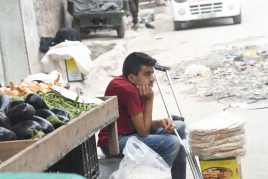 Sanctions. Syrian bishops have been requesting an end to the embargo and sanctions for years. Caritas Internationalis and Aid to the Church in Need (ACN) have joined them in this appeal. In particular, there is a pressing request to the US and the EU to “comply with the international regulatory framework that allows for exemption from embargo for humanitarian reasons.” “Although sanctions envisage exceptions for humanitarian aid funds, the latter fail to be effective”, denounced Thomas Heine-Geldern, Executive President of ACN International. European IBAN number and US Swift code, he said, “block money transfers including mention of Syria or any city in the country, making it almost impossible for charitable organisations to transfer funds for humanitarian purposes.” Over the years, ACN has donated more than EUR 40 million to the civilian population of Syria, especially to the Christian minority group. On March 10, addressing the Human Rights Council in Geneva, Caritas Internationalis called on the US government and the EU to “lift the sanctions that are preventing people in Syria from satisfying primary necessities and accessing healthcare supplies, hindering also the reconstruction of basic infrastructure.” Caritas has assisted some 830,000 Syrians across the Middle East in 2020 alone, providing shelter, food, education, health, protection, lifesaving support, water and sanitation.
Sanctions. Syrian bishops have been requesting an end to the embargo and sanctions for years. Caritas Internationalis and Aid to the Church in Need (ACN) have joined them in this appeal. In particular, there is a pressing request to the US and the EU to “comply with the international regulatory framework that allows for exemption from embargo for humanitarian reasons.” “Although sanctions envisage exceptions for humanitarian aid funds, the latter fail to be effective”, denounced Thomas Heine-Geldern, Executive President of ACN International. European IBAN number and US Swift code, he said, “block money transfers including mention of Syria or any city in the country, making it almost impossible for charitable organisations to transfer funds for humanitarian purposes.” Over the years, ACN has donated more than EUR 40 million to the civilian population of Syria, especially to the Christian minority group. On March 10, addressing the Human Rights Council in Geneva, Caritas Internationalis called on the US government and the EU to “lift the sanctions that are preventing people in Syria from satisfying primary necessities and accessing healthcare supplies, hindering also the reconstruction of basic infrastructure.” Caritas has assisted some 830,000 Syrians across the Middle East in 2020 alone, providing shelter, food, education, health, protection, lifesaving support, water and sanitation.
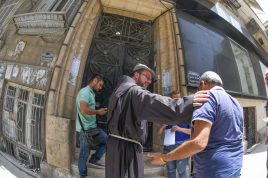 The bread of suffering. Extreme poverty extends from Knaye to Aleppo, in the words of Father Ibrahim Alsabagh, the city’s Catholic parish priest:
The bread of suffering. Extreme poverty extends from Knaye to Aleppo, in the words of Father Ibrahim Alsabagh, the city’s Catholic parish priest:
“Suffering has been our daily bread for the past ten years.”
When the war broke out ten years ago, young citizens represented the majority of Syria’s population, “one Syrian in three was under 14. Children and young people are the primary victims of this crisis: young people who grew up during the armed conflict, millions of them displaced, denied proper education. Children are growing up in an atmosphere of sadness, insecurity and lack of confidence due to continuous exposure to violence, shock and trauma.” The local Church does its best in the certainty that “this suffering will not last forever, although we don’t know when it will end.” The same hope is nurtured for the many bishops and priests abducted over the past few years, such as Father Paolo dall’Oglio, whose fate is still unknown.
Children, the primary victims. Humanitarian agencies, like UNICEF and Save the Children, have published data confirming the impact of 10 years of war on children and families in the Middle Eastern country, where around 90% of children need humanitarian assistance: 12,000 children have been killed or wounded, more than three per day on average, over 5,700 – some as young as 7 years old – were recruited to fight in the war, 2 million are out of school with an additional 1.3 million at risk of being left without an education; 6.2 million children face the risk of running out of food. As a result, over half a million children under the age of five in Syria suffer from severe developmental delays due to chronic malnutrition.
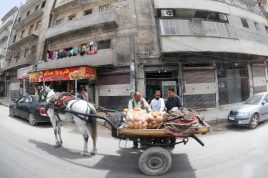 A total of 12.4 million Syrians, or 60% of the total population, have sunk into hunger and food insecurity, twice as many as in 2018, according to UN agency World Food Programme (WFP). The number of Syrians who cannot survive without food assistance, has doubled in the past year to 1.3 million. In the past year alone, an additional 4.5 million Syrians have become food insecure and food prices have risen by 200%. Households had never experienced such hardship even in the worst years of the conflict. The health system is also collapsing: there is a shortage of hospitals, adequately equipped medical centres, medicines, oxygen cylinders and Personal Protective Equipment for COVID-19. Almost two thirds of all doctors and nurses have fled the country over the years. Life expectancy in Syria has dropped by 15 years for men and 10 years for women in the last five years.
A total of 12.4 million Syrians, or 60% of the total population, have sunk into hunger and food insecurity, twice as many as in 2018, according to UN agency World Food Programme (WFP). The number of Syrians who cannot survive without food assistance, has doubled in the past year to 1.3 million. In the past year alone, an additional 4.5 million Syrians have become food insecure and food prices have risen by 200%. Households had never experienced such hardship even in the worst years of the conflict. The health system is also collapsing: there is a shortage of hospitals, adequately equipped medical centres, medicines, oxygen cylinders and Personal Protective Equipment for COVID-19. Almost two thirds of all doctors and nurses have fled the country over the years. Life expectancy in Syria has dropped by 15 years for men and 10 years for women in the last five years.
Neither winners nor losers. “Humanitarian needs cannot wait. The international community should make every effort to bring about peace to Syria and galvanize support for its children”, UNICEF Executive Director Henrietta Fore said in a statement. “There are no winners in this war, and the biggest loss is brought upon Syria’s children. It is time for warring parties to put the guns down and come to the negotiation table. Peace and diplomacy are the only way out of this abyss.” The situation in Syria is “a nightmare”, said Antonio Guterres, United Nations Secretary-General.















